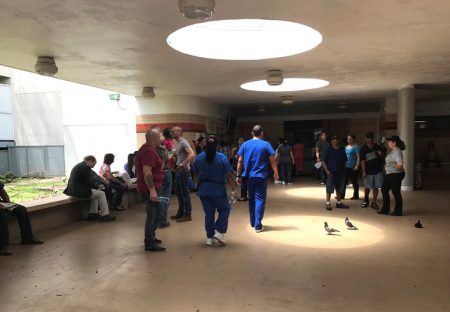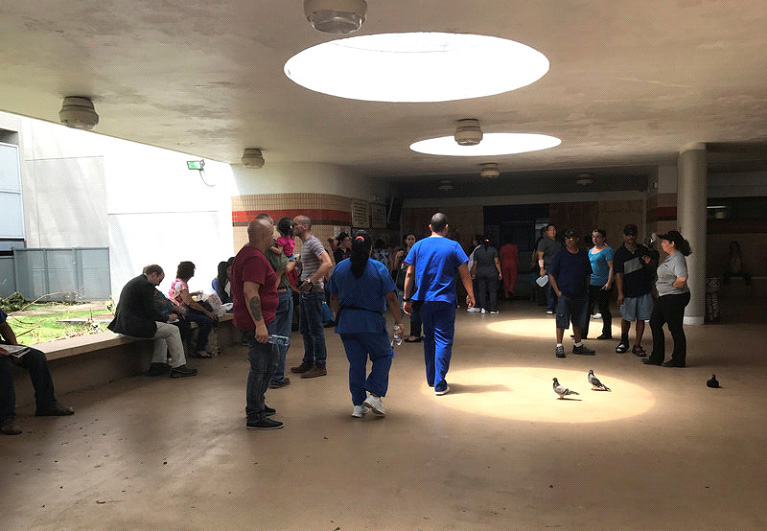SAN JUAN, PUERTO RICO, (Reuters) – Puerto Rico’s medical services are in critical condition in the wake of Hurricane Maria.
The strongest storm to hit the island in decades has left hospitals flooded, strewn with rubble and dependent on diesel generators to keep the neediest patients alive.
The precarious shape of the island’s medical facilities is adding to the misery and devastation of this U.S. territory, whose 3.4 million residents are American citizens. For some, the only option is to evacuate to the United States for treatment.

Among them is Cheira Ruiz and her baby girl Gabriellyz, who was born two weeks ago with a serious heart defect. The newborn was admitted to the Centro Cardiovascular de Puerto Rico in the capital shortly before Maria slammed into the island last Wednesday, but it was impossible for doctors to operate in such precarious conditions.
Gabriellyz was among the first infants cleared to take a medical flight out of Puerto Rico since the storm. Her parents, who live two hours south of the capital, found out the good news Friday when emergency officials knocked on their door in the town of Guanica and told them to pack for the trip to Miami. With phone service out, the doctors had called one of the island’s radio stations, which broadcast their plea for help in locating the couple. Hours before the flight was scheduled to depart, the parents learned there was only room for one of them. Mother and baby would fly alone to Miami.
“I’m trying to be strong,” Ruiz said on Saturday.
In the days since the storm, the island’s residents have awakened to an altered reality. Food is in short supply. The island’s electrical grid is down and may remain so for months. Motorists and pedestrians queue for blocks trying to secure scarce fuel to power vehicles and generators.
Cellular service, internet, and email have virtually disappeared, hurling a modern society into a bygone era; radio has become a primary source of information.
For hospitals across this region, the challenges are mounting. After the power went out, back-up generators at some hospitals failed quickly. Other hospitals are running critically low on diesel. Fuel is so precious that deliveries are made by armed guards to prevent looting, according to Dr. Ivan Gonzalez Cancel, a cardiovascular surgeon and director of the heart transplant program at Centro Cardiovascular.
“Another hospital wants to transfer two critical patients here because they don’t have electricity,” Gonzalez Cancel said. “We can’t take them. We have the same problem.”
Medical staffers are also running low on gasoline for their daily commutes to work. Puerto Ricans are queuing as long as seven hours at the island’s few functioning filling stations. Marilyn Rivera Morales, a nurse at the center, said she had enough petrol to drive to the hospital for two more days.
“How will they keep coming here if they don’t have gas?” Gonzalez Cancel wondered.
Fuel is just the beginning. The cardiovascular center was “in shambles,” Gonzalez Cancel said. Without air conditioning, the walls of the operating room were dripping with condensation and floors were slippery, he said. Most patients had been discharged or evacuated to other facilities, but some patients remained because their families could not be reached by phone.
On the sidewalk outside the cardiac center on Saturday, Jorge Rivera and his wife Dorca approached Gonzalez Cancel to ask about the woman’s father, a patient still inside waiting for triple-bypass surgery. The couple are residents of Savannah, Georgia who were in Puerto Rico to care for their loved one.
With the hospital scaling down operations and the island’s infrastructure on its knees, Gonzalez Cancel estimated he would not perform another open heart surgery for a month or more. His advice to the couple: leave.
“I am talking to you, not as a physician, I am talking to you as a human being,” he said. “Get him on a plane. You can be in Miami in two and a half hours.”
But leaving is not simple. With the island’s main airport still crippled, Gonzalez Cancel said he needed to secure a special waiver from authorities to obtain the medical evacuation flight for baby Gabriellyz. Travelers at the airport on Sunday were told that passengers who do not already have tickets may not be able to secure flights out until October 4.
“PEOPLE ARE GOING TO START DYING”
Officials here expect the situation at Puerto Rico’s hospitals could worsen before it improves. At Centro Medico, the island’s largest public hospital, the disaster medical assistance team of the U.S. Department of Health and Human Services is setting up makeshift hospital units.
“I think this might be a calm before we see an influx as other hospitals lose generators,” said Commander Michael Garner, a regional coordinator for the effort.
The devastation caused by Maria is similar to that wrought by hurricanes Katrina, Harvey and Irma. But Puerto Rico’s remoteness, lack of communications and fragile infrastructure exacerbate the logistical challenges of recovery “on a very grand scale,” Garner said.
U.S. Air Force Colonel Michael Valle, who arrived in Puerto Rico on Friday to help with recovery efforts, agreed.
“To me, this is a lot worse, because you can’t drive in from other states. Everything must come by boat or by air,” Valle said.
Adding to the worries, a Puerto Rico dam damaged by heavy rains was in danger of failing on Sunday, posing a risk to communities along the rain-swollen Guajataca River. If the dam fails, the flooding would be life-threatening, the National Weather Service warned. “Stay away or be swept away,” it said.
At least 10 people have died so far in Puerto Rico, where the humanitarian crisis is growing.
The Federal Emergency Management Agency has been posting images on Twitter of U.S. responders on the ground in Puerto Rico, including the U.S. Coast Guard and FEMA search-and-rescue teams.
But patience is starting to fray with the speed of the aid response.
“We need a massive military response,” surgeon Gonzalez Cancel said.
Waiting for news about his father-in-law, Rivera, the Georgia resident and a 49-year-old Iraq War veteran, said the U.S. military could only do so much. He forecast the island would take months to get back on its feet.
“You need God pretty much to fix every light bulb,” he said.
Dr. Juan Carlos Sotomonte, the medical director of the Centro Medico’s cardiovascular unit, said intervention – divine or otherwise – is needed fast.
“If this is not taken care of, people are going to start dying,” he said

